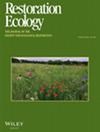恢复的成本和效益仍未得到充分量化:巴西大西洋森林系统文献综述提供的证据
IF 2.8
3区 环境科学与生态学
Q2 ECOLOGY
引用次数: 0
摘要
实现国际森林恢复目标需要经济上可行的土地利用方案。巴西大西洋森林是生态系统恢复的优先地区,因为该地区大面积砍伐森林,为集约农业提供了空间,同时也是世界上生物多样性受到威胁最大的热点地区之一。我们系统地查阅了有关该生物群落的现有科学文献,以强调有关森林恢复的经济效益和成本的证据。共有 15 篇文献对森林恢复的成本和/或经济效益进行了量化。我们注意到,大多数研究(12 篇)发表于 2018 年之后,而且有关该主题的研究存在生物地理偏见,因为有 12 篇出版物提到了巴西东南部地区的研究地点。鉴于其有益的自然条件,大西洋森林注定会有大量与恢复相关的机会,但恢复的经济效益却未得到充分探索(7 项研究)。此外,文献中几乎没有关于恢复森林的多功能使用所带来的收益的研究,只有三项研究提供了原始数据。对恢复成本的阐述也仅限于 10 项主要关注积极恢复的研究。因此,我们认为,人们对森林恢复的经济成本和效益并不十分了解。然而,明确经济成本和效益对于制定政策和调动私人投资至关重要。因此,我们呼吁开展研究,填补大西洋森林生物群落恢复经济学方面的知识空白,并研究其他生物群落的恢复经济学。本文章由计算机程序翻译,如有差异,请以英文原文为准。
Costs and benefits of restoration are still poorly quantified: evidence from a systematic literature review on the Brazilian Atlantic Forest
The achievement of international forest restoration goals requires economically viable land‐use options. The Brazilian Atlantic Forest is a priority area for ecosystem restoration, as it is widely deforested to make place for intensive agriculture and one of the most threatened biodiversity hotspots in the world. We systematically reviewed existing scientific literature on the biome to highlight the evidence on economic benefits and costs of forest restoration. A total of 15 publications were identified that quantify costs and/or economic benefits of forest restoration. We observed that most studies (12) were published after 2018 and that research on the topic was biogeographically biased as 12 publications referred to study sites in Brazil's Southeast Region. Given its beneficial natural conditions, the Atlantic Forest is predestined for a wide range of restoration‐related opportunities, yet economic benefits of restoration are underexplored (seven studies). Moreover, benefits from a multifunctional use of restored forests are almost absent in the literature with only three studies presenting primary data. Elaboration of restoration costs is also limited to 10 studies that focus predominantly on active restoration. Thus, we argue that the economic costs and benefits of forest restoration are not well understood. Clarity thereon is, however, critical for policy formulation and to mobilize private investments. We therefore call for studies to fill in the knowledge gap on restoration economics in the Atlantic Forest biome, and to study restoration economics in other biomes as well.
求助全文
通过发布文献求助,成功后即可免费获取论文全文。
去求助
来源期刊

Restoration Ecology
环境科学-生态学
CiteScore
6.50
自引率
15.60%
发文量
226
审稿时长
12-24 weeks
期刊介绍:
Restoration Ecology fosters the exchange of ideas among the many disciplines involved with ecological restoration. Addressing global concerns and communicating them to the international research community and restoration practitioners, the journal is at the forefront of a vital new direction in science, ecology, and policy. Original papers describe experimental, observational, and theoretical studies on terrestrial, marine, and freshwater systems, and are considered without taxonomic bias. Contributions span the natural sciences, including ecological and biological aspects, as well as the restoration of soil, air and water when set in an ecological context; and the social sciences, including cultural, philosophical, political, educational, economic and historical aspects. Edited by a distinguished panel, the journal continues to be a major conduit for researchers to publish their findings in the fight to not only halt ecological damage, but also to ultimately reverse it.
 求助内容:
求助内容: 应助结果提醒方式:
应助结果提醒方式:


